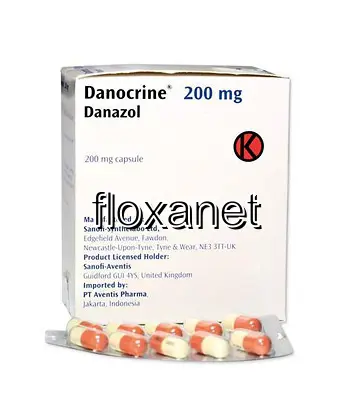| Package | Dosage | Price | Price per Dose | |
|---|---|---|---|---|
| Dosage: 50mg | ||||
| 360 pill | 50mg | NZD1,061.35 | NZD2.95 | |
| 180 pill | 50mg | NZD535.34 | NZD2.97 | |
| 120 pill | 50mg | NZD360.00 | NZD2.99 | |
| 90 pill | 50mg | NZD275.84 | NZD3.06 | |
| 60 pill | 50mg | NZD189.34 | NZD3.16 | |
| 30 pill | 50mg | NZD100.50 | NZD3.37 | |
| Dosage: 100mg | ||||
| 180 pill | 100mg | NZD1,094.08 | NZD6.08 | |
| 120 pill | 100mg | NZD738.73 | NZD6.15 | |
| 90 pill | 100mg | NZD558.72 | NZD6.20 | |
| 60 pill | 100mg | NZD376.37 | NZD6.27 | |
| 30 pill | 100mg | NZD191.68 | NZD6.36 | |
| Dosage: 200mg | ||||
| 120 pill | 200mg | NZD967.84 | NZD8.07 | |
| 90 pill | 200mg | NZD736.39 | NZD8.18 | |
| 60 pill | 200mg | NZD533.00 | NZD8.88 | |
| 30 pill | 200mg | NZD275.84 | NZD9.16 | |

Danazol Description
Introduction to Danazol
Danazol is a synthetic steroid derived from ethisterone, a derivative of testosterone. It is primarily used in the treatment of various hormonal and gynecological conditions. As an androgen and weak anabolic agent, danazol influences the production of hormones in the body, helping to regulate certain medical issues. Its unique mechanism makes it effective in managing diseases related to hormone imbalance and immune disorders.
Uses and Medical Benefits
Danazol is commonly prescribed for the treatment of endometriosis, a painful condition where tissue similar to the lining of the uterus grows outside the uterus. It helps reduce the size and activity of endometrial tissue, alleviating pain and other symptoms. The medication is also used to treat hereditary angioedema, a condition characterized by sudden and severe swelling. By suppressing the formation of certain proteins involved in swelling, danazol helps prevent attacks. In some cases, it is used for fibrocystic breast disease and some types of anemia. Its ability to modulate hormone levels makes it a versatile option in various clinical scenarios.
How Danazol Works
Danazol functions by suppressing the function of the ovaries and pituitary gland, leading to decreased production of hormones like estrogen and progesterone. This reduction inhibits the growth of endometrial tissue and decreases symptoms associated with it. Additionally, danazol's weak androgenic effect can alter immune responses, making it valuable for treating immune-related conditions. Its action results in decreased menstrual flow, alleviation of pain, and controlling swelling episodes in hereditary angioedema. Due to its hormonal activity, careful monitoring is necessary during treatment.
Possible Side Effects
Like all medications, danazol may cause side effects, though not everyone experiences them. Common adverse effects include weight gain, acne, oily skin, and hot flashes. Some users may experience irregular menstrual cycles or vaginal spotting. Because it influences hormone levels, there is a risk of mood changes, headaches, and sleep disturbances. Long-term use might lead to bone density loss or liver problems. Rare but serious side effects include liver tumors and changes in cholesterol levels. It is essential to discuss medical history with a healthcare provider before starting treatment and to be monitored regularly during therapy.
Precautions and Interactions
Patients should inform their healthcare provider about any existing health conditions, especially liver disease, breast or uterine cancer, or a history of blood clots. Pregnant or breastfeeding women must avoid danazol, as it can harm the fetus or pass into breast milk. It is also vital to consider potential drug interactions; danazol can affect the metabolism of other medications, altering their effectiveness. Combining it with anticoagulants or certain antidepressants requires caution and medical supervision. Regular liver function tests are recommended to ensure safety during prolonged treatment.
Usage Guidelines
Danazol is usually administered orally in the form of capsules. The dosage and duration depend on the condition being treated and the patient's response. It is important to follow the doctor's instructions precisely and not to stop the medication abruptly without consulting a healthcare provider. Patients should report any side effects or unusual symptoms promptly. Maintaining a healthy lifestyle, including proper nutrition and avoiding alcohol, can help mitigate some side effects. Regular medical check-ups are necessary for monitoring effectiveness and potential adverse reactions.
